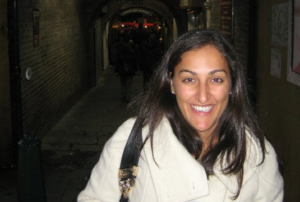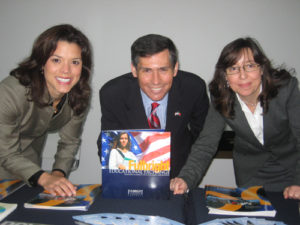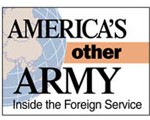Wearing Flip-Flops More Often Than Suits
 Anjalina Sen is a diplomat of a peculiar kind. She finds diplomatic receptions “a bit more onerous than sleeping in a bamboo hut for a week.” It makes sense, then, that she has spent her nine years in the Foreign Service so far working mostly on refugee issues.
Anjalina Sen is a diplomat of a peculiar kind. She finds diplomatic receptions “a bit more onerous than sleeping in a bamboo hut for a week.” It makes sense, then, that she has spent her nine years in the Foreign Service so far working mostly on refugee issues.
“We do a lot of business at receptions, but the field work I do is phenomenal,” she said. “Talking to refugees about their experience, their hopes and dreams, and figuring out how to bring that up with our policy — that’s what gets me really excited. I’m often in refugee camps, so I spend a lot of time in flip flops. I don’t like wearing a suit.”
The daughter of a Canadian mother and an Indian father, Sen grew up in Brazil, Mexico and Portugal. After working on Wall Street, she made what seemed a natural career choice for someone with her cosmopolitan upbringing. Soon after joining the Foreign Service, she found herself in the middle of the now-infamous passport crisis of 2007, when new entry requirements for Americans traveling to Canada and other countries in the Western Hemisphere caused a huge flood of passport applications, overwhelming the State Department. In a very unusual move, Sen and most of her entry-level colleagues were assigned to an emergency task force to help ease the load.
“We didn’t have enough computers and had to hand-adjudicate passport applications,” she said. “But it was a great bonding experience, and I’m still really close with the people I was on that task force with…”
>> READ THE FULL STORY ON THE HUFFINGTON POST

 Gavin Sundwall stood beside the grave, a Bible in hand, and read John 11:25-26: “I am the resurrection and the life…” Two taxi drivers, who had become the deceased woman’s chauffeurs during the last years of her life, shared memories of her and shed tears. They sprinkled the woman’s ashes over the graves of her two husbands, which were just a few feet apart.
Gavin Sundwall stood beside the grave, a Bible in hand, and read John 11:25-26: “I am the resurrection and the life…” Two taxi drivers, who had become the deceased woman’s chauffeurs during the last years of her life, shared memories of her and shed tears. They sprinkled the woman’s ashes over the graves of her two husbands, which were just a few feet apart.